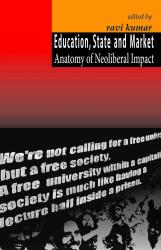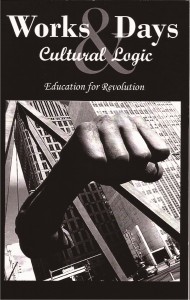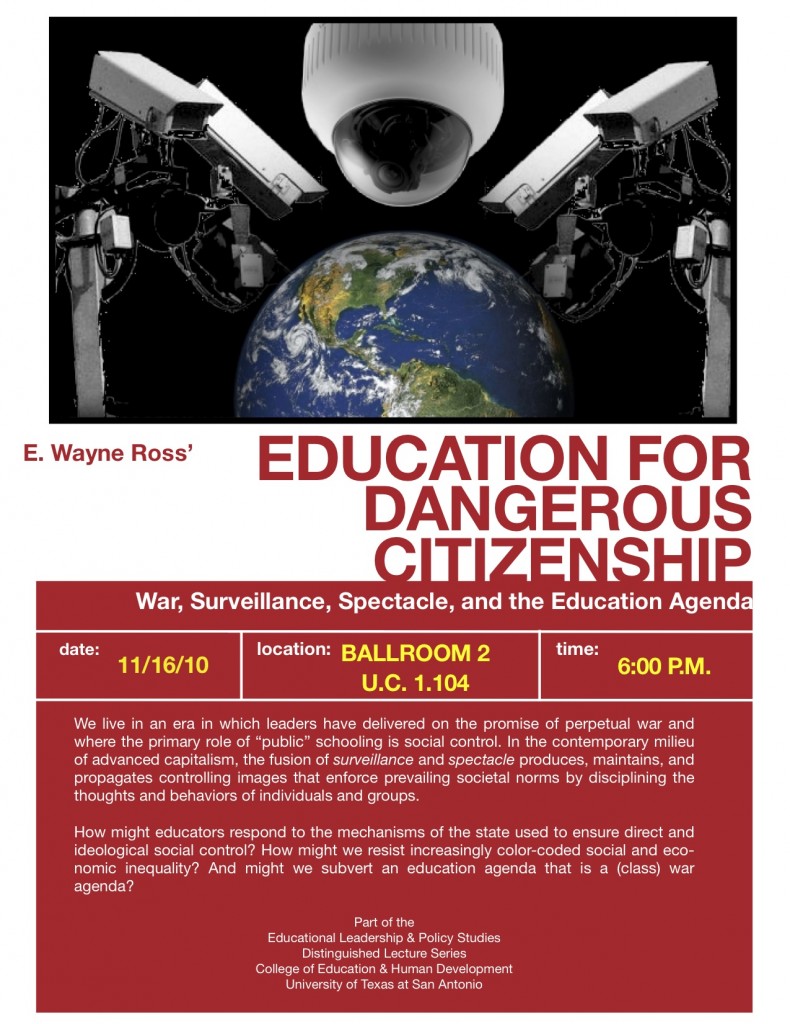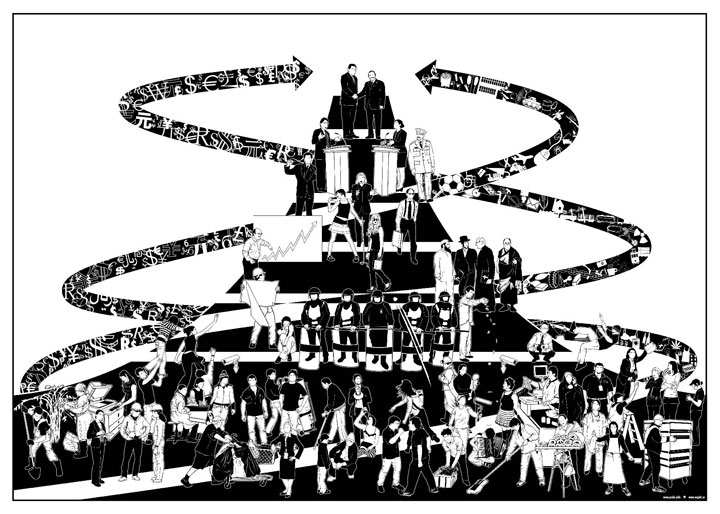Tag Archives: capitalism
Education, State and Market: Anatomy of Neoliberal Impact
Ravi Kumar‘s new book Education, State and Market: Anatomy of Neoliberal Impact published by Aakar Books (Delhi) is the first volume to comprehensively examine the impact of neoliberal capitalism on education in India.
Kumar is a professor in the Department of Sociology at the University of South Asia, in Delhi. He blogs here and is also part of the editorial collective at Radical Notes.
Praise for the volume:
The book presents a set of papers that illuminate in profound ways how the wide-angle historical frames provided by Marxist analysis facilitate our understanding of the details embedded in national and more local educational contexts. Neoliberalism attacks human dignity. The consequences of social, economic, and educational policies that exacerbate inequality, magnify exploitation, and undermine personal and social freedoms are clearly analyzed by each of the contributors. The circumstances are dire and readers will most certainly be outraged as they learn how neoliberal policies and practices reduce the process of education to a commodity and teachers and learners to elements in formula for the relentless production of profit. This volume presents a clear and compelling analysis of how neoliberal thought and practice has transformed education at the policy level in India and in the process distorted the official aims of education as well as social relations among teachers and learners. Most importantly, however, these chapters provide insights into how we might channel our rage against neoliberal capitalist mechanisms into the creation of new visions of resistance to educational practices that privilege profits over people.
– E. Wayne Ross, University of British Columbia, Canada
Editor Ravi Kumar has assembled the finest scholarship to investigate key questions in regard to the relationship of the development of modern capitalism, its connections to empire, the role of the state, and the resulting impact on education. The essays within go to the core: what is valued as “knowledge” now? Who shall schools serve? Indeed: Why have school? The critical reader will find new questions, and profound answers.
– Rich Gibson, Professor Emeritus, San Diego State University, USA
Education for Revolution special issue of Works & Days + Cultural Logic launched
Education for Revolution a special issue collaboration of the journals Works & Days and Cultural Logic has just been launched.
Check out the great cover image (Monument to Joe Louis in Detroit) and the equally great stuff on the inside. Hard copies of the issue available from worksanddays.net and Cultural Logic will be publishing and expanded online version of the issue in the coming months.
Rich and I want to thank David B. Downing and his staff at Works & Days for the fabulous work they did on this issue, which is the second collaboration between the two journals. Read Downing’s foreword to the issue here.
Works & Days + Cultural Logic
Special Issue: Education for Revolution
E. Wayne Ross & Rich Gibson (Editors)
Table of Contents
Barbarism Rising: Detroit, Michigan, and the International War of the Rich on the Poor
Rich Gibson, San Diego State University
Resisting Neoliberal Education Reform: Insurrectionist Pedagogies and the Pursuit of Dangerous Citizenship
E. Wayne Ross, University of British Columbia
Kevin D. Vinson, University of The West Indies
Reimaging Solidarity: Hip-Hop as Revolutionary Pedagogy
Julie Gorlewski, State University of New York, New Paltz
Brad Porfilio, Lewis University
Learning to be Fast Capitalists on a Flat World
Timothy Patrick Shannon, The Ohio State University
Patrick Shannon, Penn State University
Contesting Production: Youth Participatory Action Research in the Struggle to Produce Knowledge
Brian Lozenski, Zachary A. Casey, Shannon K. McManimon, University of Minnesota
Schooling for Capitalism or Education for Twenty-First Century Socialism?
Mike Cole, University of East London
Class Consciousness and Teacher Education: The Socialist Challenge and The Historical Context
Curry Stephenson Malott, West Chester University of Pennsylvania
The Pedagogy of Excess
Deborah P. Kelsh, The College of Saint Rose
Undermining Capitalist Pedagogy: Takiji Kobayashi’s Tōseikatsusha and the Ideology of the World Literature Paradigm
John Maerhofer, Roger Williams University
Marxist Sociology of Education and the Problem of Naturalism: An Historical Sketch
Grant Banfield, Flinders University of South Australia
The Illegitimacy of Student Debt
David Blacker, University of Delaware
Hacking Away at the Corporate Octopus
Alan J. Singer, Hofstra University
A Tale of Two Cities ¬– and States
Richard Brosio, University of Wisconsin, Milwaukee
SDS, The 1960s, and Education for Revolution
Alan J. Spector, Purdue University, Calumet
New edition of “The Social Studies Curriculum: Purposes, Problems, and Possibilities” in production
I’m very pleased to announce that the Fourth Edition of the The Social Studies Curriculum: Purposes, Problems, and Possibilities is now in production at The State University of New York Press and will be available in 2014.
This fourth edition includes 12 new chapters on: the history of the social studies; creating spaces for democratic social studies; citizenship education; anarchist inspired transformative social studies; patriotism; ecological democracy; Native studies; inquiry teaching; Islamophobia; capitalism and class struggle; gender, sex, sexuality and youth experiences in school; and critical media literacy. Chapters carried over from the Third Edition, which was published in 2006, have been substantially revised and updated, including those: on teaching in the age of curriculum standardization and high-stakes testing; critical multicultural social studies; prejudice and racism, assessment; and teaching democracy.
As with previous editions——the first edition of The Social Studies Curriculum was published in 1997 and the Revised Edition was released in 2001——the aim of this collection of essays is to challenge readers to reconsider their assumptions and understandings of the origins, purposes, nature, and possibilities of the social studies curriculum.
A fundamental assumption of this collection is that the social studies curriculum is much more than subject matter knowledge—a collection of facts and generalizations from history and the social science disciplines to be passed on to students. The curriculum is what students experience. It is dynamic and inclusive of the interactions among students, teachers, subject matter and the social, cultural, economic and political contexts education. The true measure of success in any social studies course or program will be found in its effects on individual students’ thinking and actions as well as the communities to which students belong. Teachers are the key component in any curriculum improvement and it is our hope that this book provides social studies teachers with perspectives, insights, and knowledge that are beneficial in their continued growth as professional educators.
I am very appreciative to all the authors who wrote chapters for this and previous editions of the book, including: Jane Bernard-Powers, Margaret Smith Crocco, Abraham DeLeon, Terrie Epstein, Ronald W. Evans, Linda Farr Darling, Stephen C. Fleury, Four Arrows (aka Don T. Jacobs), Kristi Fragnoli, Rich Gibson, Neil O. Houser, David W. Hursh, Kevin Jennings, Gregg Jorgensen, Lisa Loutzenheiser, Joseph Kahne, Gloria Ladson-Billings, Christopher R. Leahey, Curry Stephenson Malott, Perry M. Marker, Sandra Mathison, Cameron McCarthy, Merry Merryfield, Jack L. Nelson, Nel Noddings, Paul Orlowski, Valerie Ooka Pang, J. Michael Peterson, Marc Pruyn, Greg Queen, Frances Rains, David Warren Saxe, Doug Selwyn, Özlem Sensoy, Binaya Subedi, Brenda Trofanenko, Kevin D. Vinson, Walter Werner, Joel Westheimer, and Michael Whelan. Each of one of these contributors are exemplary scholars and educators and their work has had a tremendous impact on my own thinking and practice as well as many other educators.
Contents
The Social Studies Curriculum: Purposes, Problems, and Possibilities
(4th Edition)
Preface
Part I: Purposes of the Social Studies Curriculum
1. Social Studies Curriculum Migration: Confronting Challenges in the 21st Century
Gregg Jorgensen, Western Illinois University
2. Social Studies Curriculum and Teaching in the Age of Standardization
E. Wayne Ross, University of British Columbia
Sandra Mathison, University of British Columbia
Kevin D. Vinson, The University of the West Indies
3. Creating Authentic Spaces for Democratic Social Studies Education
Christopher R. Leahey, North Syracuse (NY) Public Schools & SUNY Oswego
4. “Capitalism is for the Body, Religion is for the Soul”: Insurgent Social Studies for the 22nd Century
Abraham P. DeLeon, University of Texas, San Antonio
Part II: Social Issues and the Social Studies Curriculum
5. Dangerous Citizenship
E. Wayne Ross, University of British Columbia
Kevin D. Vinson, The University of the West Indies
6. Teaching Students to Think About Patriotism
Joel Westheimer, University of Ottawa
7. Ecological Democracy: An Environmental Approach to Citizenship Education
Neil O. Houser, University of Oklahoma
8. Native Studies, Praxis, and The Public Good
Four Arrows, Fielding Graduate University
9. Marxism and Critical Multicultural Social Studies Education: Redux
Curry Malott, West Chester University
Marc Pruyn, Monash University
10. Prejudice, Racism, and the Social Studies Curriculum
Jack L. Nelson, Rutgers University
Valerie Ooka Pang, San Diego State University
11. The Language of Gender, Sex, and Sexuality and Youth Experiences in Schools
Lisa Loutzenheiser, University of British Columbia
Part III: The Social Studies Curriculum in Practice
12. Making Assessment Work for Teaching and Learning
Sandra Mathison, University of British Columbia
13. Why Inquiry?
Doug Selwyn, SUNY Plattsburgh
14. Beyond Fearing the Savage: Responding to Islamophobia in the Classroom
Özlem Sensoy, Simon Fraser University
15. Class Struggle in the Classroom
Greg Queen, Fitzgerald Senior High School (Warren, MI)
16. Critical Media Literacy and Social Studies
Paul Orlowski, University of Saskatchewan
17. Teaching Democracy: What Schools Need to Do
Joseph Kahne, Mills College
Joel Westheimer, University of Ottawa
Part IV: Conclusion
18. Remaking the Social Studies Curriculum
E. Wayne Ross, University of British Columbia
New issue of Cultural Logic: “Culture and Crisis”
Cultural Logic
2010
SPECIAL ISSUE:
CULTURE AND CRISIS
EDITED BY JOSEPH G. RAMSEY
Introduction
Joseph G. Ramsey
“Culture and Crisis”
The Current Conjucture:
Capitalist Crises and the Crisis of the Left
Michael Joseph Roberto, Gregory Meyerson, Jamey Essex, and Jeff Noonan
“Moment of Transition:
Structural Crisis and the Case for a Democratic Socialist Party”
Julie P. Torrant
“Class and the New Family in the Wake of the Housing Collapse”
Dan DiMaggio
“Road Maps, Dead Ends, and the Search for Fresh Ground:
How Can We Build the Socialist Movement in the 21st Century?”
Crisis, Imagination, and the Return to Marx’s Capital
Max Haiven
“The Financial Crisis as a Crisis of the Imagination”
Vesa Oittinen and Andre Maidansky
“A Marx for the Left Today:
Interview with Marcello Musto”
Amedeo Policante
“Vampires of Capital:
Gothic Reflections between Horror and Hope”
Robert T. Tally Jr.
“Meta-Capital:
Culture and Financial Derivatives”
Rethinking Crises in
Twntieth-Century Socialism and Communism
Grover Furr
“Stephen Cohen’s Biography of Bukharin:
A Study in the Falsehood of Khrushchev-Era ‘Revelations'”
Remembering the Depression Era:
Recovering Left Culture in a Time of Crisis
Benjamin Balthaser
“Re-Staging the Great Depression:
Genre as Social Memory in Darren Aronofsky’s The Wrestler“
Barbara Foley
Forward to Wrestling with the Left:
The Making of Ralph Ellison’s Invisible Man
Tristan Sipley
“Proletarian Pastoral Reconsidered:
Reading Mike Gold in an Age of Ecological Crisis”
Chris Vials
“Fight Against War and Fascism and
the Origins of Antifascism in US Culture”
Theoretical Practice in a Time of Crisis:
Adorno, Benjamin, and Brecht
Rich Daniels
“Non-Pious Discourse:
Adorno, Ethics, and the Politics of Suffering”
Kevin Floyd
“The Importance of Being Childish:
Queer Utopians and Historical Contradiction”
Carl Grey Martin
Review of
Walter Benjamin and Bertold Brecht —
The Story of a Friendship
Reading Crisis as Ruling-Class Strategy
Kanishka Chowdhury
“Deflecting Crisis:
Critiquing Capitalism’s Emancipation Narrative”
Heather Steffen
“Student Internships and the Privilege to Work”
Poetry
Mary Kennan Herbert
“Been There, Done That” and
“Nothing to Say”
George Snedeker
“Progress” and Other Poems
Joseph G. Ramsey
“Fault Lines: Haiti, Two Years On”
What is Capitalism Hiding?
What is Capitalism Hiding?
By Bertell Ollman
What exactly is it about capitalism that our rulers are trying to hide? The short list would have to include: (1) that the most apt label for our society-because it brings into focus how our society works (particularly in production, an area of life that most of the other labels ignore or obscure), for whom it works better, for whom it works worse, and its potential for change—is “capitalism”; (2) that the real rulers of this society are those who own the means of production, distribution and exchange, and reap the bulk of the surplus; (3) that the Government, whatever democratic foreplay goes on, serves their interests, hence is their Government and not ours; (4) that we, the rest of us who don’t live on profit, rent or interest, are workers (whether we are willing to admit it or not), because we are forced to seek work in order to live; (5) that the conditions of life and work for us workers are bad and likely to get much worse-while the wealth of the capitalists keeps growing; (6) that a qualitatively better life, a more humane, just, free, democratic, egalitarian and ecologically rational way of organizing society can be developed; (7) that those who benefit from the present order of society have consistently lied to us about all of the above; and (8) that once workers—in the broad sense of the term—break through these lies and half-truths, they/we can win.
Now the best way for the capitalists to hide all of these facts is to hide the first one, that our’s is a capitalist society, because once people learn this all of the facts that follow become easier to see and to grasp. In his book, In Praise of Folly, Erasmus tells the story of a man watching a play who all at once jumps onto the stage and tears the masks off of the actors to reveal who they really are. If you think of Marx as this man and the capitalists as the actors, you can begin to understand both what Marx does and why the capitalists are not too pleased with him for doing it.
From How to Take an Exam and Remake the World by Bertell Ollman (2001, Black Rose Books)
Education for Dangerous Citizenship
I’ll be at the University of Texas at San Antonio in November giving a talk as part of the Educational Leadership & Policy Studies Distinguished Lecture Series.
The talk, titled “Education for Dangerous Citizenship”, will draw from some of my recent work with Rich Gibson (e.g., “The Education Agenda is a War Agenda” and “No Child Left Behind and the Imperial Project”) and Kevin D. Vinson (“The Concrete Inversion of Life”: Guy Debord, the Spectacle, and Critical Social Studies Education” [pdf]). The UTSA talk will cover some of the foundational ideas for a book Kevin and I are currently writing titled Dangerous Citizenship: A Theory and Practice of Contemporary Critical Pedagogy.
Thanks to Abraham DeLeon for organizing things at UTSA.
Here’s the blurb:
Education for Dangerous Citizenship: War, Surveillance, Spectacle, and the Education Agenda
We live in an era in which leaders have delivered on the promise of perpetual war and where the primary role of “public” schooling is social control. In the contemporary milieu of advanced capitalism, the fusion of surveillance and spectacle produces, maintains, and propagates controlling images that enforce prevailing societal norms by disciplining the thoughts and behaviors of individuals and groups. How might educators respond to the mechanisms of the state used to ensure direct and ideological social control? How might we resist increasingly color-coded social and economic inequality? And might we subvert an education agenda that is a (class) war agenda?
Rouge Forum Update: March on March 20 and Mayday! Here’s to the Bogus Health Care Bill Met By Endless War!
Remember Proposals are Due, April 15, for the Rouge Forum Conference
Send Your Articles, Photos, Cartoons, for the RF News to Community Coordinator Adam Renner.
Links to Classic Rouge Forum Flyers:
“Got War?”
Justice or Barbarism
Shoot Moneybags, Not People
Always be sure you are right, then go ahead
On the Little Rouge School Front:
Colbert vs Foner: This was passed along by social studies good-guy Tony Whitson.
My favorite line (Colbert to Eric Foner): “They say that those who fail to learn from history are doomed to repeat it. But, if you change what history was, doesn’t that solve that problem?”
Words Counted in the Ratt (Race to the Top) Literacy Plan:
-standards: 48
-assessment: 37
-reward: 34
-literacy: 19
-rigor: 16
-challenge: 15 (including new buzz phrase “challenge schools”)
-accountable/accountability: 14
-math: 11
-science: 10
-history: 7
-poverty: 7
-language arts: 5
-compete/competition: 4
-thinking: 2
-library: 1
-reading: 0
-writing: 0
-book: 0
Broad’s Errand Boy Bobb Demagogics it Up for Parents: Still, he said, he expects to eliminate approximately 2,100 jobs, continue to reduce health care costs and outsource as many options as possible in fiscal year 2010-11. There was a noticeable air of displeasure in the audience as Bobb said he plans to announce on Wednesday which 45 schools will close at the end of this school year.
Detroit Federation of Teachers Refuses to Join Suit Against Broad’s Bobb: “The Detroit Federation of Teachers voted Thursday against joining the lawsuit, with leadership calling it frivolous. However, the union did vote to file a complaint with the state ethics commission against Bobb for accepting the funds, said Keith Johnson, the president.”
The Official Program for the Gutting of Chicago Public Schools: Class Size to 37!
UTLA Boss Favors Revamping Tenure, Certification–Eats Breakfast With Broad: “I would have no problem with changing the tenure rules and extending probation. We should not take tenure away once you get it but [have] some form of recertification.”
NY Times OpEd–National Socialism for the Schools
The They Say Cut Back; We Say Fight Back Front:
March On March 30 Against the Empires Wars and Mayday Too: The Traditional Rouge Forum Mayday Flyer
On the Perpetual War Front: March on March 20th, Anniversary of the Invasion:
Key Data on the Iraq War Since the Invasion
Read more the Rouge Forum Update here.
Matt Taibbi explains why the government is an executive committee of the rich
Now Taibbi doesn’t put it exactly that way, but there is no other conclusion that can be drawn from his fabulously clear explanations and analyses of the global economic meltdown in a trilogy of articles for Rolling Stone.
In “Wall Street’s Naked Swindle” (in the latest Rolling Stone #1089), Taibbi describes how investment banks cannibalized their own kind (Bear Stearns and Lehman Brothers) via a counterfeit stock scheme (e.g., naked short-selling). (Taibbi gives a video lesson on short-selling here.)
Taibbi clearly illustrates that “the American capital markets are a crime in progress,” and that “our economy is so completely fucked, the rich are running out of things to steal.” Thus why they are turning on themselves.
He sums things up this way:
The nation’s largest financial players are able to write the rules for own their [sic] businesses and brazenly steal billions under the noses of regulators, and nothing is done about it. A thing so fundamental to civilized society as the integrity of a stock, or a mortgage note, or even a U.S. Treasury bond, can no longer be protected, not even in crisis, and a crime as vulgar and conspicuous as counerfeiting can take place on a systemic level for years without being stopped, even after it begins to affect the modern-day equvialents of the Rockefellers and the Carnegies. What 10 years ago was a cheap stock-fraud scheme for second-rate grifters in Brooklyn has become a major profit center for Wall Street. Our burglar class now rules the national economy. And no one is trying to stop them.
Well, the government is not only not trying to stop them, Taibbi’s own article describes how the U.S. Treasury Department, staffed by ex-Goldman Sachs executives, facilitates the fleecing of the rest of us. Why is this happening…because the U.S. government is an executive committee of the rich.
See Taibbi’s other RS articles on the economy:
The Big Takeover—The global economic crisis isn’t about money – it’s about power. How Wall Street insiders are using the bailout to stage a revolution (RS 1075, March 19, 2009)
Inside The Great American Bubble Machine—Matt Taibbi on how Goldman Sachs has engineered every major market manipulation since the Great Depression (RS July 2, 2009)
The new pyramid of the capitalist system
Inspired by the old I.W.W. “PYRAMID of CAPITALIST SYSTEM”, this poster is a portrayal of class society as it appears to us today. The whirlwind of market forces encircle and shape society, operating through our activity, yet behind our backs. People at different levels of the modern capitalist pyramid enjoy it or defend it or cope with it or fight it or get drunk to forget about their place in it. This poster was designed in collaboration by wapiti.se and prole.info.
Download a print quality PDF of the new pyramid of the capitalist system here.
Order the Rouge Forum version of the original IWW pyramid of the capitalist system here.
 Follow
Follow




